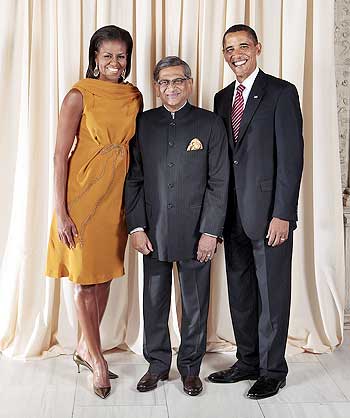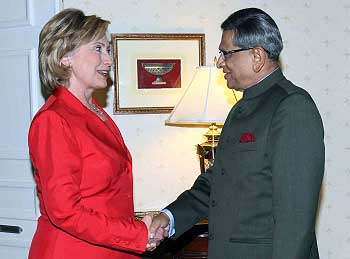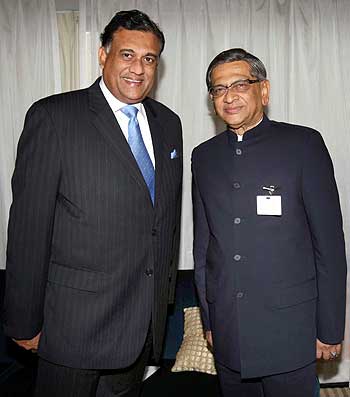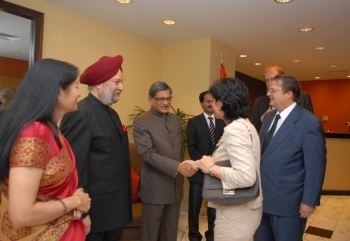Photographs: Lawrence Jackson
The least Pakistan can do, says External Affairs Minister S M Krishna, is to bring the culprits who orchestrated the terror attack on Mumbai to justice.
In an interview with rediff.com's Aziz Haniffa in New York, Krishna talks about India's unwavering stance on Pakistan, taking the Indo-American ties to the next level, New Delhi's relations with Sri Lanka and Iran's nuclear ambitions.
This is your first trip to the United States, as India's foreign minister, to attend the United Nations General Assembly. I believe that the number of bilateral meetings you have had is second only to that of US Secretary of State Hillary Clinton at the UN. How has this whole experience been for you?
It was a very satisfying experience, meeting with so many of my counterparts from various other countries bilaterally and then multilaterally, in groups and in the various forums. I have liked my association with these foreign ministers and I am looking forward to continuing my engagement with them whenever the occasion arises.
Will there be any substantive announcements about US-India relations during Prime Minister Manmohan Singh's State Visit to Washington, DC, on November 24?
Don't you think we should wait till the 25th or 26th of November? We better wait for that.
'We will not shift our stance under pressure from anybody'
Image: US Secretary of State Hillary Clinton with External Affairs Minister S M Krishna on Sep 25Photographs: Jay Mandal/On Assignment
When I interviewed Assistant Secretary of State for South Asian Affairs Robert Blake a few weeks ago, he said that both sides were now working on the various facets of the five pillars announced in the Joint Statement between Secretary Clinton and you in New Delhi. Could you speak about how some of these dialogues have been shaping up as you received the reports from the concerned teams?
I think since Secretary Clinton's visit to Delhi, the India-United States relationship has moved on and with Dr Singh's visit to the US, it certainly would be lifted to the highest level. So, we are conscious of it and we are gearing up to that.
Two of the pillars are about education and technology, and the United States is particularly interested in taking the education pillar to the next level, according to Assistant Secretary Blake.
They have been advocating that on the educational front, not enough of the potential of both the countries has been fully achieved. That's one area we will be concentrating on. In the technology area, both of us are strong -- we are strong in information technology and they are strong in some other areas of technology. So, we stand to gain by interacting with them.
With the Obama administration's push for the Nuclear Non-Proliferation Treaty compliance and the Comprehensive Test Ban Treaty, and as they say in Washington, with the return of the so-called nonproliferation ayatollahs like Gary Samore and Robert Einhorn leading the charge, won't this necessarily put some kind of stress on New Delhi to conform with these treaties?
You might recall that India has always taken a very principled and consistent stand on non-proliferation. We do not wish to shift that stance under pressure from anybody because we have taken a principled stand and we believe in the stand we have taken.
Besides the NPT and the CTBT, there are also the differences on climate change, the Doha Round. Are carbon emission caps a complete non-starter where India is concerned in Copenhagen? Is this totally non-negotiable?
We would like to become part of such a solution itself. We are willing to look into areas where India can adapt, or India can get the needed technology, and our concern basically is to improve the development of the people of India, especially those who live below the poverty line.
So, development assumes special importance insofar as India is concerned. In keeping with the development agenda that we have, which we believe is necessary to pursue, we will certainly look into the climate change issue -- the contributions that India can make in order to make the Copenhagen effort a success.
'Nobody talked to me about Kashmir'
Image: S M Krishna with Pakistan Foreign Minister Shah Mahmood Qureshi in New York on September 27, 2009Photographs: Video: Paresh Gandhi
During your bilateral meeting with the Pakistani Foreign Minister (Shah Mahmood Qureshi), you made it clear that the terrorists and conspirators behind the Mumbai terror attack have to be brought to justice and that this is mandatory for the composite dialogue to be resurrected. Prime Minister Manmohan Singh made this very clear too at his press conference after the G-20 summit. But US officials and Pakistani analysts have argued that the Pakistani government has to be given some slack by India because it's a new, democratic, civilian government and that the revival of the composite dialogue should not be held hostage to the Mumbai terror attack. Are you willing to give Pakistan that space?
India has stated its position very clearly. There is no ambiguity in our stand and nothing will make us change this stand.
Which is that first bring the 26/11 conspirators and terrorists to justice?
That is the least that Pakistan can do.
If the talks and the composite dialogue are to be resurrected?
For any talks for that matter.
I know this came up during your interaction at the Council on Foreign Relations (which was closed to the press) regarding murmurs in Washington and among think-tanks on the whole Kashmir issue -- that the time is ripe to move forward on it and so on. What is your take on this?
Nobody in a responsible position from the United States side talked to me about Kashmir. Nobody talked to me about it at all.
Despite India's concerns, and even deep Congressional concerns by some US lawmakers, the Kerry-Lugar massive economic and security assistance package to Pakistan was pushed through by the Obama administration. Is this something that is going to impinge into the envisaged strategic relationship between US and India, because there is a perennial concern that the security assistance specifically meant for counter-terrorism is being diverted for use against India?
Yes, that's a legitimate concern. We have -- through our sources and whenever we have bilateral exchanges with our counterparts -- always conveyed that whenever the US provides aid, particularly to Pakistan, they must also see that that aid is used for the purpose for which it is given. Unfortunately, that strict monitoring isn't taking place.
Also, there's the argument and concern that there's a double standard in the fighting of terrorism on the western front and the eastern front (where the US seems to be more concerned about its war on terror against the Al Qaeda and the Taliban than the terrorism perpetrated against India by Pakistan-based terrorist outfits).
Terrorism cannot be fought selectively, you know. It has to be fought across the board. That is India's stand.
'India is willing to help in rehabilitation of Lankan Tamils'
Image: External Affairs Minister S M Krishna with Sri Lankan Foreign Minister Rohitha Bogollagama on Sep 22Photographs: Jay Mandal/On Assignment
Now that the question of Iran's alleged nuclear weapons programme has come up again, do you think this issue could cause a hiccup in Indo-US ties, as India maintains close relations with Iran?
India has made known its stand on proliferation. We do not want another nuclear power on our doorstep. That is the position that India has taken.
You met your Sri Lankan counterpart, Mr (Rohitha) Bogollagama. Some argue that India has not come down hard on the Sri Lankan government, over the issue of thousands of internally displaced persons still languishing in squalid camps, as it fears that this might push Lanka into the China camp. What do you say to such arguments?
I wouldn't like to join the club of speculators. All I know is that there are 250,000 Tamil-speaking Sri Lankan citizens who are still living in camps and India has been conveying to Sri Lanka that these IDPs should be rehabilitated in a civilised fashion and India is willing to help in the efforts to rehabilitate these people. We are looking forward to Sri Lanka's proactive measures in this regard.
Is this something you brought up strongly with your Lankan counterpart when you met him?
Whenever we meet, this is one of the subjects which we discuss.
I believe India has been providing significant humanitarian aid to Lanka?
Yes, we have been providing them significant resources and materials and we'll continue with that. There are de-mining teams which have been sent by India at the request of the Sri Lankan government.
'India doesn't have an agenda in Afghanistan'
Image: Krishna with India's Permanent Representative at the United Nations Hardayal S Puri on Sep 25Photographs: Paresh Gandhi
US Commander in Afghanistan General Stanley McCrystal's comments, vis-a-vis India complicating the situation there, has stirred a hornet's nest. Will this is any way affect India's continuing involvement in Afghanistan?
I must make it very clear that India doesn't have an agenda in Afghanistan. We are there to rebuild Afghanistan -- to help in the process of rebuilding Afghanistan -- and that is the limited agenda we have and we intend completing that.





article